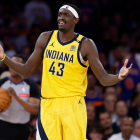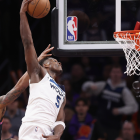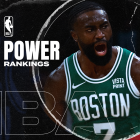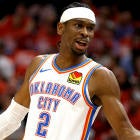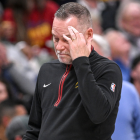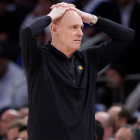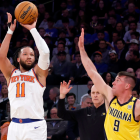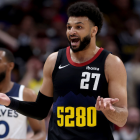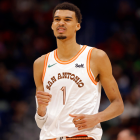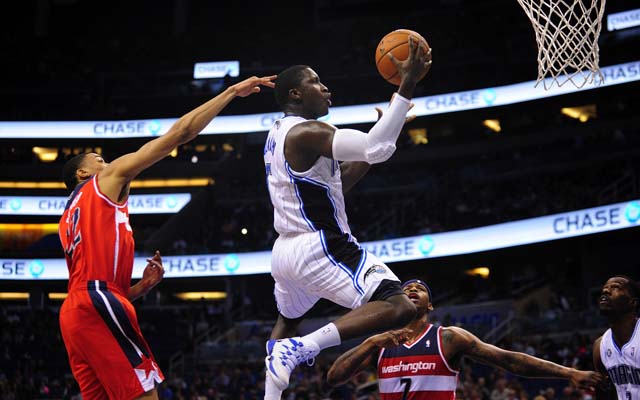
CBSSports.com's Eye On Basketball is taking a team-by-team look at the 2014 NBA offseason. We continue with the Orlando Magic. Check out the rest of the offseason reports here.
How they finished 2014: In psychology, there's this theory of a concept called cognitive dissonance. What it basically means is that you have a set of ideals or beliefs, and then either a contradictory ideal or belief is absorbed simultaneously, or you are presented with information which reveals this belief to be untrue, and you suffer stress from it. It's like if you believed very strongly that you loved all strawberry ice cream, and this was a key part of your being, and then you had a flavor of strawberry ice cream you didn't like. That's a bummer.
(It's actually much more complicated than that but I'm already too far down the rabbit hole here.)
Anyway, the 2014 Magic gave me a lot of cognitive dissonance. The entire year I watched them and thought "You know? This team really isn't that bad!" Victor Oladipo was the best rookie from January 1 on, making his not winning ROY that much more ridiculous. They had some athletes, and Nikola Vucevic was a beast. They were kind of fun to watch for the first half of games, before their aging, ineffective veterans and profound youth eventually sent the game into a spiral. But I remember watching games like their win over the Thunder and other contests where it really looked like they had turned a corner. This team was getting better.
In reality, they finished 10-24 in the final three months of the season.
This was year one of the significant rebuild. The 2013 campaign was year zero, where you suffer through the absence of your star (Dwight Howard) and just have to slog along without significant young talent. Last year was the feeling-out process. Oladipo. Vucevic, Tobias Harris, Andrew Nicholson. They didn't play well, or together, but they showed some flashes, and that's all you're really going for while you work to trade your veterans or wait for their contracts to expire.
What they would do this summer as of significant interest. There's something there, but you can just as easily make the case that what's there isn't any good.
Offseason needs: Some offense. Bear in mind that the Magic still had the very serviceable Jameer Nelson on the roster, Arron Afflalo who put in an All-Star worthy year as a scorer and showed the best of his game on that end, and all the frontcourt options. Yet they were 29th in points per possession last season.
Their offense is clunky, and always seems to be caught between trying to run and trying to slow it down. Some of that is indecision from the youngsters, or impatience in other times. Some of it was a genuine blaise from the veterans who were stuck on a rebuilding team. But the reality was unchanged. They needed offense.
They also needed to clear the decks of their veterans. It was time to move forward with the young core, including their two draft picks, and let go of some of the veterans, or at least free them from the rebuilding prison they were stuck in. Arron Afflalo was entering a contract year and wanted to join a playoff team, Jameer Nelson the same.
It was time to clear the decks and go through the growing pains.
The draft: The Magic went left when a lot of people thought they'd go right, passing on Dante Exum to pick up Arizona forward Aaron Gordon. It was a curious pick because it didn't address their concern about Oladipo running point, or give them a shooting weapon. Gordon was also tagged with the "tweener" label and has a short wingspan.
The Magic here basically decided to double down on defense while also giving Oladipo a real weapon to run the floor with. Gordon can get up and down the floor, and when he gets either direction, he skies. His athleticism is straight up freakish, and you can expect him to fill the highlight reels with dunks next year, even if his shooting percentage suffers. His free-throw mark is his real concern, but concerns about his overall jumper are slightly exaggerated. He's not MKG. He's not Bradley Beal either, but there's a foundation of a shot there.
Then, with pick No. 12, the Magic got a little tricky. They traded up with the Sixers to grab Elfrid Payton, who had stormed up the mock drafts thanks to his workouts and skillset. Payton is a pure point, a great distributor with a good sense of attack, strong defensive fundamentals and size... and no shot whatsoever. He combines with Oladipo to form what may be the worst shooting backcourt in the league (though Minnesota's going to give them a run with Rubio-Wiggins). But he does give them the pure point they didn't think Oladipo could be, and another tenacious defender.
Typically, teams draft for offense, and try and develop defense. The Magic are doing something wholly different. They have geared this team, which was already a respectable-for-their-lottery-spot 17th in points allowed per possession (defensive efficiency) to be a monster defensively in a few short years. They're missing a shot blocker, but other than that they have a lockdown point guard with length and speed, a strong, versatile defensive guard with great hands and instincts, a Shawn-Marion-type wing whose athleticism and instincts could make him uncommonly great at his position. If they do manage to find a shot blocker to go next to Nikola Vucevic, they're going to be huge trouble defensively.
The problem is that leaves the offense hurting, and hurting badly. But if everyone's going to preach the importance of defense, and then assume you can teach rookies to play it, why not draft elite defensive talent and teach them to score in a well-balanced system like the one Jacque Vaughn is trying to implement?
In the second round, they nabbed Roy Devyn Marble, and signed him to a multi-year contract. He's got great potential as a bench scoring option or a 3-and-D roleplayer.
Free agency and trades: And here is where things went nuts.
So before the draft, days before, the Magic traded Arron Afflalo to Denver for Evan Fournier and the 56th pick. This was a big, bold move. They did a good thing by sending Afflalo to his former team, somewhere he's comfortable, somewhere he can contend for a playoff spot. They also got what looks on the surface like poor return for him.
The reality is that very few people even know who Fournier is. He earned playing time with the Nuggets under George Karl in 2013 and actually looked very good. He has a nice euro-step inside, a clean jumper and some athleticism. His instincts as far as running an offense or a break as a ball-handler, though ... that's where things get problematic. If Fournier were part of larger deal, he might be the steal of it. As essentially the big name for it, it's not a great look. But it does at least give them a two-guard who can score a little bit, even if his field goal percentage dropped to 42 percent last season.
Then, out of the blue, the Magic signed Ben Gordon, surprising many who thought he was not alive. Gordon was spending his time on the bench in Charlotte, after his horrific Detroit years under a massive contract landed him with the Bobcats. At one point, after the 2009 season, Gordon was a legitimate star. But the disaster in Detroit seemed to infect him and he's clashed with every coach he's had since.
The Magic signed him to a two-year, $9 million deal, which made everyone freak out. The key to this deal is that the second year is fully non-guaranteed, meaning the Magic can simply waive him after this season and clear him off the books. It's basically a one-year, $4.5 million deal. You have to factor in that rebuilding teams have to pay veterans more, and that small markets have to pay veterans more. So that means this deal winds up looking a little like $3 million for one season, in reality. But many feel that's still too much for Gordon.
Typically, I'm a stickler for maintaining good return on investment no matter what your cap situation. You're the Nets and paying the tax anyway and the owner literally is worth more than several European nations? That still doesn't mean you should shell out for Kris Humphries. And the Magic gave a guy who's been a locker room cancer $4.5 million guaranteed when he couldn't get on the floor for the Bobcats, even before last season when they were good.
But think of it this way. The Magic made a $4.5 million gamble with no long-term ramifications or luxury tax implications. If Gordon is terrible, if the whole team is terrible, this team can start over completely next year. But if Gordon is able to bring them any scoring, anything at all, that alone is worth it to a team this in need of scoring. If they'd traded for Gordon at that number, the outrage wouldn't have been as great. But giving him a one-year deal that they control was somehow worse.
I'm not saying the move was a good one, it's hard to figure a way it was. I'm saying I get it.
The Magic kept on the offensive-centric free agent streak (completely flipping conventional wisdom that says draft offense, sign defense) by giving Channing Frye a four-year, $32 million deal. Frye is now the highest paid player on the Magic, and that alone is weird. ShamSports.com reports the deal declines each season, ending in $7.4 million in 2017/2018, which makes it a bit more tradeable, long-term.
Frye gives them what they need, a big who is an elite shooter and can stretch the floor in the pick and pop game. And at that, he is nearly unparalleled. Frye shot 45.6 percent last season on pick and pop jumpers in Phoenix, at an astonishing 1.28 points per possession, good for 93rd percentile in the entire league.
If you wanted to give Oladipo and Payton a guy to sling the ball to for shots, Frye's a great option.
Frye's getting older, and isn't a great rebounder, can't create on his own and isn't a terrific defender. But he's very serviceable, and again, small-market rebuilding teams pay the tax to add guys. The Magic didn't flood the team with veterans, they selectively chose guys they needed. Frye's stellar locker room reputation doesn't hurt, either.
Speaking of quality role players with good reputations, come on down Luke Ridnour! They landed the veteran backup guard for two-years, $5.5 million and it gives them someone on the team who knows how to run a team and can mentor the young guys. Ridnour's still pretty effective for his pay grade. This one was sneaky good.
They let go of Jameer Nelson, Jason Maxiell, and Doron Lamb, and picked up Willie Green from the Clippers on waivers. Again, offense.
Overall grade and accomplishments -- B-: I know, I know, I know. They can't shoot. I hear you.
But they can shoot! I just told you they got arguably the best guy in the league to shoot out of the pick and roll! They got veteran guys who can't do anything but shoot!
OK, they're still going to struggle to score. But the draft was an uncommon set of ideals, but I can see the plan. If the worst thing they have in three years is a very capable backup pure point and an athletic energy guy who can defend, they're still looking pretty good. And if everything does come together for the new guys?
Man alive, do the Magic have a fastbreak terror team on their hands. Fast, strong, and talented.
They spent some money, but honestly, they had money to spend to hit the floor. The Magic's total salary this season so far, before the Ridnour signing? $52 million via ShamSports.com, and some of that is dead money for players they've waived. Orlando has long-term flexibility, athletic young guys, and some veterans who can make the team better. Isn't that the definition of what a small-market rebuilding team should do with its summer?
This could all come crashing down and they could wind up with a D-minus or F in retrospect. But there's a plan here, albeit a strange and unconventional one, and I'll give points for that if nothing else.
That's the secret to cognitive dissonance. You resolve it by either changing your worldview or doubling down to reinforce it.













